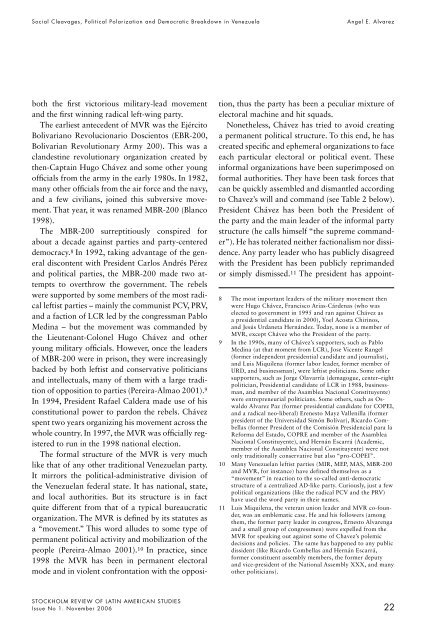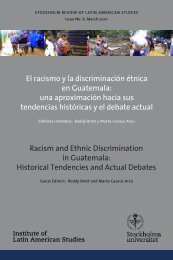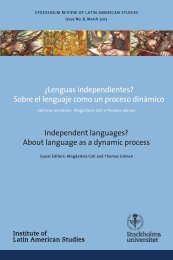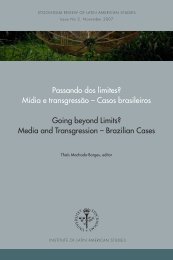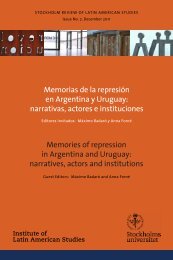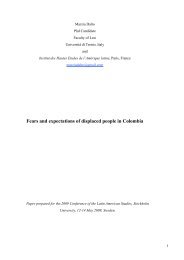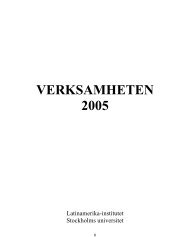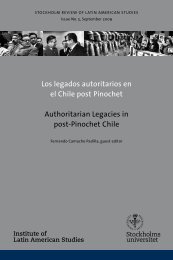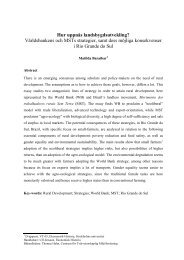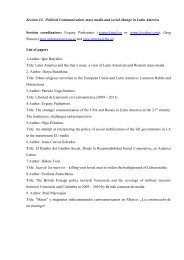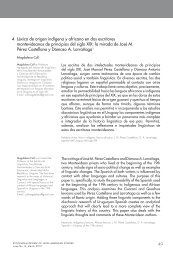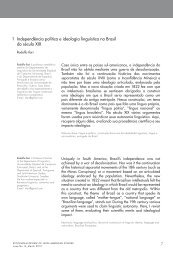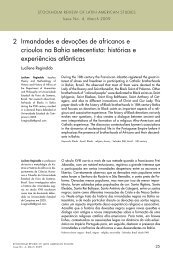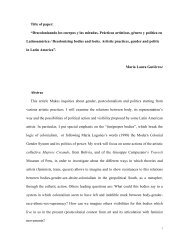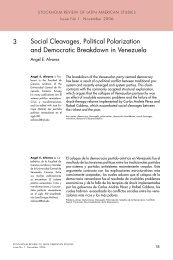Venezuelan Politics and Society in Times of Chavismo PolÃtica y ...
Venezuelan Politics and Society in Times of Chavismo PolÃtica y ...
Venezuelan Politics and Society in Times of Chavismo PolÃtica y ...
Create successful ePaper yourself
Turn your PDF publications into a flip-book with our unique Google optimized e-Paper software.
Social Cleavages, Political Polarization <strong>and</strong> Democratic Breakdown <strong>in</strong> Venezuela<br />
Angel E. Alvarez<br />
both the first victorious military-lead movement<br />
<strong>and</strong> the first w<strong>in</strong>n<strong>in</strong>g radical left-w<strong>in</strong>g party.<br />
The earliest antecedent <strong>of</strong> MVR was the Ejército<br />
Bolivariano Revolucionario Doscientos (EBR-200,<br />
Bolivarian Revolutionary Army 200). This was a<br />
cl<strong>and</strong>est<strong>in</strong>e revolutionary organization created by<br />
then-Capta<strong>in</strong> Hugo Chávez <strong>and</strong> some other young<br />
<strong>of</strong>ficials from the army <strong>in</strong> the early 1980s. In 1982,<br />
many other <strong>of</strong>ficials from the air force <strong>and</strong> the navy,<br />
<strong>and</strong> a few civilians, jo<strong>in</strong>ed this subversive movement.<br />
That year, it was renamed MBR-200 (Blanco<br />
1998).<br />
The MBR-200 surreptitiously conspired for<br />
about a decade aga<strong>in</strong>st parties <strong>and</strong> party-centered<br />
democracy. 8 In 1992, tak<strong>in</strong>g advantage <strong>of</strong> the general<br />
discontent with President Carlos Andrés Pérez<br />
<strong>and</strong> political parties, the MBR-200 made two attempts<br />
to overthrow the government. The rebels<br />
were supported by some members <strong>of</strong> the most radical<br />
leftist parties – ma<strong>in</strong>ly the communist PCV, PRV,<br />
<strong>and</strong> a faction <strong>of</strong> LCR led by the congressman Pablo<br />
Med<strong>in</strong>a – but the movement was comm<strong>and</strong>ed by<br />
the Lieutenant-Colonel Hugo Chávez <strong>and</strong> other<br />
young military <strong>of</strong>ficials. However, once the leaders<br />
<strong>of</strong> MBR-200 were <strong>in</strong> prison, they were <strong>in</strong>creas<strong>in</strong>gly<br />
backed by both leftist <strong>and</strong> conservative politicians<br />
<strong>and</strong> <strong>in</strong>tellectuals, many <strong>of</strong> them with a large tradition<br />
<strong>of</strong> opposition to parties (Pereira-Almao 2001). 9<br />
In 1994, President Rafael Caldera made use <strong>of</strong> his<br />
constitutional power to pardon the rebels. Chávez<br />
spent two years organiz<strong>in</strong>g his movement across the<br />
whole country. In 1997, the MVR was <strong>of</strong>ficially registered<br />
to run <strong>in</strong> the 1998 national election.<br />
The formal structure <strong>of</strong> the MVR is very much<br />
like that <strong>of</strong> any other traditional <strong>Venezuelan</strong> party.<br />
It mirrors the political-adm<strong>in</strong>istrative division <strong>of</strong><br />
the <strong>Venezuelan</strong> federal state. It has national, state,<br />
<strong>and</strong> local authorities. But its structure is <strong>in</strong> fact<br />
quite different from that <strong>of</strong> a typical bureaucratic<br />
organization. The MVR is def<strong>in</strong>ed by its statutes as<br />
a “movement.” This word alludes to some type <strong>of</strong><br />
permanent political activity <strong>and</strong> mobilization <strong>of</strong> the<br />
people (Pereira-Almao 2001). 10 In practice, s<strong>in</strong>ce<br />
1998 the MVR has been <strong>in</strong> permanent electoral<br />
mode <strong>and</strong> <strong>in</strong> violent confrontation with the opposition,<br />
thus the party has been a peculiar mixture <strong>of</strong><br />
electoral mach<strong>in</strong>e <strong>and</strong> hit squads.<br />
Nonetheless, Chávez has tried to avoid creat<strong>in</strong>g<br />
a permanent political structure. To this end, he has<br />
created specific <strong>and</strong> ephemeral organizations to face<br />
each particular electoral or political event. These<br />
<strong>in</strong>formal organizations have been superimposed on<br />
formal authorities. They have been task forces that<br />
can be quickly assembled <strong>and</strong> dismantled accord<strong>in</strong>g<br />
to Chavez’s will <strong>and</strong> comm<strong>and</strong> (see Table 2 below).<br />
President Chávez has been both the President <strong>of</strong><br />
the party <strong>and</strong> the ma<strong>in</strong> leader <strong>of</strong> the <strong>in</strong>formal party<br />
structure (he calls himself “the supreme comm<strong>and</strong>er”).<br />
He has tolerated neither factionalism nor dissidence.<br />
Any party leader who has publicly disagreed<br />
with the President has been publicly reprim<strong>and</strong>ed<br />
or simply dismissed. 11 The president has appo<strong>in</strong>t-<br />
8 The most important leaders <strong>of</strong> the military movement then<br />
were Hugo Chávez, Francisco Arias-Cárdenas (who was<br />
elected to government <strong>in</strong> 1995 <strong>and</strong> ran aga<strong>in</strong>st Chávez as<br />
a presidential c<strong>and</strong>idate <strong>in</strong> 2000), Yoel Acosta Chir<strong>in</strong>os,<br />
<strong>and</strong> Jesús Urdaneta Hernández. Today, none is a member <strong>of</strong><br />
MVR, except Chávez who the President <strong>of</strong> the party.<br />
9 In the 1990s, many <strong>of</strong> Chávez’s supporters, such as Pablo<br />
Med<strong>in</strong>a (at that moment from LCR), Jose Vicente Rangel<br />
(former <strong>in</strong>dependent presidential c<strong>and</strong>idate <strong>and</strong> journalist),<br />
<strong>and</strong> Luis Miquilena (former labor leader, former member <strong>of</strong><br />
URD, <strong>and</strong> bus<strong>in</strong>essman), were leftist politicians. Some other<br />
supporters, such as Jorge Olavarría (demagogue, center–right<br />
politician, Presidential c<strong>and</strong>idate <strong>of</strong> LCR <strong>in</strong> 1988, bus<strong>in</strong>essman,<br />
<strong>and</strong> member <strong>of</strong> the Asamblea Nacional Constituyente)<br />
were entrepreneurial politicians. Some others, such as Oswaldo<br />
Alvarez Paz (former presidential c<strong>and</strong>idate for COPEI,<br />
<strong>and</strong> a radical neo-liberal) Erenesto Mayz Vallenilla (former<br />
president <strong>of</strong> the Universidad Simón Bolívar), Ricardo Combellas<br />
(former President <strong>of</strong> the Comisión Presidencial para la<br />
Reforma del Estado, COPRE <strong>and</strong> member <strong>of</strong> the Asamblea<br />
Nacional Constituyente), <strong>and</strong> Hernán Escarrá (Academic,<br />
member <strong>of</strong> the Asamblea Nacional Constituyente) were not<br />
only traditionally conservative but also “pro-COPEI”.<br />
10 Many <strong>Venezuelan</strong> leftist parties (MIR, MEP, MAS, MBR-200<br />
<strong>and</strong> MVR, for <strong>in</strong>stance) have def<strong>in</strong>ed themselves as a<br />
“movement” <strong>in</strong> reaction to the so-called anti-democratic<br />
structure <strong>of</strong> a centralized AD-like party. Curiously, just a few<br />
political organizations (like the radical PCV <strong>and</strong> the PRV)<br />
have used the word party <strong>in</strong> their names.<br />
11 Luis Miquilena, the veteran union leader <strong>and</strong> MVR co-founder,<br />
was an emblematic case. He <strong>and</strong> his followers (among<br />
them, the former party leader <strong>in</strong> congress, Ernesto Alvarenga<br />
<strong>and</strong> a small group <strong>of</strong> congressmen) were expelled from the<br />
MVR for speak<strong>in</strong>g out aga<strong>in</strong>st some <strong>of</strong> Chavez’s polemic<br />
decisions <strong>and</strong> policies. The same has happened to any public<br />
dissident (like Ricardo Combellas <strong>and</strong> Hernán Escarrá,<br />
former constituent assembly members, the former deputy<br />
<strong>and</strong> vice-president <strong>of</strong> the National Assembly XXX, <strong>and</strong> many<br />
other politicians).<br />
Stockholm REVIEW OF Lat<strong>in</strong> American Studies<br />
Issue No 1. November 2006<br />
22


